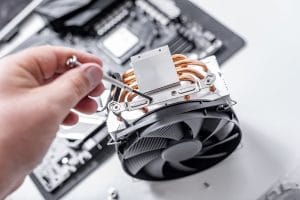 Efficiency is a complicated word in many industries. The goal is usually to improve it, but as technology continues to take over more operations in more industries, that improvement often means tweaking certain aspects of their technologies. For example, implementing a faster, more efficient, and automated system can instantly boost efficiency on the surface, but if maintaining that equipment becomes tedious or burdensome, then it can override that boost in efficiency. To avoid this, companies are increasingly relying on more advanced thermal management systems, such as heat exchangers, that can prevent electrical overheating with optimal efficiency.
Efficiency is a complicated word in many industries. The goal is usually to improve it, but as technology continues to take over more operations in more industries, that improvement often means tweaking certain aspects of their technologies. For example, implementing a faster, more efficient, and automated system can instantly boost efficiency on the surface, but if maintaining that equipment becomes tedious or burdensome, then it can override that boost in efficiency. To avoid this, companies are increasingly relying on more advanced thermal management systems, such as heat exchangers, that can prevent electrical overheating with optimal efficiency.
The way solutions handle waste heat
The efficiency of any thermal management system is largely determined by the methods it uses to prevent electrical overheating. For example, traditional electrical cooling units use chilled air to keep the temperature inside of an electrical enclosure low. This has long been an effective method, but it has also been notoriously cumbersome and requires large amounts of energy, and the routine maintenance and repairs they need can negatively impact a company’s overall efficiency. By contrast, more efficient thermal management solutions operate by absorbing and transferring waste heat. This also prevents the temperature inside of an electrical enclosure from rising, but does so in a way that doesn’t require equipment that needs constant maintenance.
The rate at which heat is handled
Though traditional electrical cooling solutions may be cumbersome, they’re sometimes still used to handle large amounts of waste heat for high-performance applications. However, modern heat exchangers can often handle waste heat at just as high a rate, and often higher. By using an eco-friendly fluid’s latent heat of vaporization, heat exchangers can rapidly absorb and transfer heat in a continuous loop. This allows applications to continue operating at maximum capacity without worrying about the levels of waste heat that it generates.
The impact solutions have on operations
With the ability to handle electrical thermal management efficiently even for high-performance applications, heat exchangers have grown increasingly more popular in most industries. Their benefits have also extended far beyond improving the efficiency of modern electrical thermal management. For example, more rapid and efficient electrical cooling has also helped companies boost their overall productivity, particularly in areas that are largely controlled by technology. It has also helped companies reduce their environmental footprints in more affordable and efficient ways.
For more information about what efficiency means when it comes to thermal management, call Noren Thermal Solutions in Taylor, TX, at 866-936-6736.







